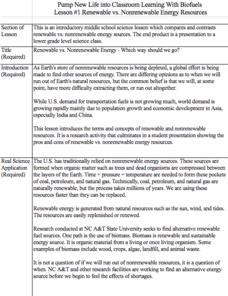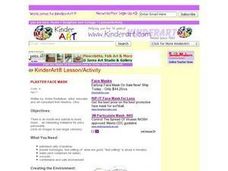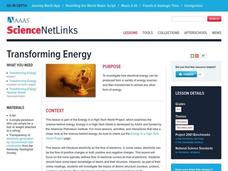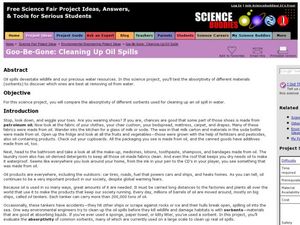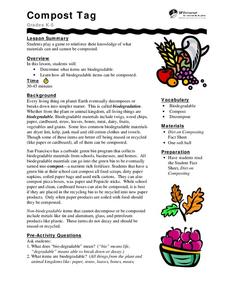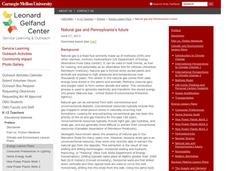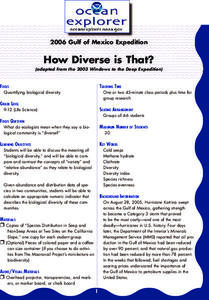Kenan Fellows
Renewable vs. Nonrenewable Energy Resources
Is one type of energy inherently good or bad? Young scientists explore energy resources in a week-long unit. After extensive research, groups create powerful position statements and presentations supporting their energy resource of choice.
Curated OER
Sources of Energy
Fifth graders take a close look at how energy changes from one form to another within their surroundings. They also study the ten different sources of energy and determine which are renewable and which are non-renewable. This seven-page...
Curated OER
Made from Animals
Here is a terrific lesson for elementary schoolers on products that come from animals. In it, pupils discover that we get a lot more than just food from animals. After a class discussion and teacher-led demonstration, learners utilize...
Curated OER
Plaster Face Mask
The process may be difficult, but the end product will be worth it. Kids will love creating these plaster masks made from their own faces. If they can sit still long enough, they can become the model for their own masks. All the steps,...
Curated OER
It's a Gas! Or is it?
Oceanography enthusiasts are given a series of thought experiments to consider in order to relate the solubility of gases and solids to underwater volcanoes. It is not particularly engaging to perform these thought experiments. Choose...
Curated OER
Transforming Energy
Super detailed, this activity will educate physical science learners about the flow of electrons. Begin by reviewing potential and kinetic energy with a moving pendulum, and then get them online to observe interactive websites about...
Curated OER
Cleaning up an oil spill
Small groups complete a science project involving cleaning up an oil spill. In this experiment, pupils use 4 different sorbents to discover which one absorbs the most oil. Afterward, they make a data table.
Curated OER
It's a Gas! Or is it?
Examine the effects of temperature and pressure on solubility and the states of matter of ocean water. Learners make inferences about the unique chemistry of ocean water at different depths. They engage in an activity related to...
Curated OER
Transportation Fuels Debate
Students study the different transportation fuels. In this energy sources instructional activity students debate the merits of their fuel over others while working together in groups.
Curated OER
Residential Power System
Perform data analysis on energy consumption to apply algebraic expressions to the real world. Learners will write and solve equations that answer various questions from residential power use. They will collect data at home and calculate...
SF Environment
Pre-School Composting and Recycling!
You can never be too young to get involved in composting or recycling. Here is a lesson that has been made for the very littlest learners and it's all about the importance of conservation. They'll sort compostable and recyclable objects,...
SF Environment
Compost Tag
Composting is a great way to get children involved in recycling. First, they discuss how biodegradable products decompose to make compost. Then, they talk about what can and cannot be composted. They play a game similar to around the...
Carnegie Mellon University
Transportation
Teach your environmental studies, life science, or engineering class how an internal combustion engine works using the first few slides of the accompanying presentation. Then, focus in on the resulting carbon emissions. Finally, take a...
Curated OER
Chalk Chromatography
Your chemistry class is sure to love this experiment on column chromatography, as demonstrated with chalk sticks and felt tip markers. Pupils use sidewalk chalk (another inexpensive form of chalk stick) to demonstrate adsorption and the...
Teach Engineering
Capillarity – Measuring Surface Tension
How do cohesion and adhesion work together? The third installment of a nine-part series teaches young scientists the difference between adhesion and cohesion. They also learn how cohesion and adhesion work together to cause capillary...
NOAA
Importance of Deep-Sea Ecosystems – Chemists with No Backbones
Marine invertebrates offer us many new options for developing pharmaceutical drugs, such as w-conotoxin MVIIA, which is extracted from the cone snail and is a potent painkiller. The lesson encourages scholars to research various types of...
NOAA
Biological Oceanographic Investigations – Keep Away
As of 2015, there are 53,481 oil wells in the Gulf of Mexico. Scholars determine how species diversity is impacted based on the ecosystem's distance from a drilling platform. It focuses on finding the mean of data sets and creating bar...
Teach Engineering
Antimatter Matters
Use science fiction movies to teach pupils about antimatter and alternate universes. Individuals learn about the portrayal of antimatter and alternate universes in movies such as Star Trek and Angels & Demons. They consider three...
Curated OER
Chick Chock's Pollen Problem
Students analyze how allergens effect the body and how air borne substances can effect people.
Curated OER
Fossil Fuels: Facing the Issues
Students explore energy by researching fuel usage on Earth. In this fossil fuel lesson, students define fossil fuels, the energy created by burning them, and the impact on the environment when using them. Students conduct pollution...
Carnegie Mellon University
Natural Gas and Pennsylvania’s Future
Beginning with a general discussion about natural gas, methane, and hydrocarbons, a few videos and diagrams are projected to support the lecture. Individuals participate in a brief activity by drinking juice through a straw, and then...
Curated OER
Life is Weird
Separate your science class into small groups and assign each a specific deep-sea organism to research. The class will learn about all of the organisms as each group presents their assigned animal. Following their presentations, you can...
Curated OER
How Diverse is That?
After reviewing biodiversity, learners work in small groups to analyze actual species distribution data. They learn to calculate the Shannon-Weaver diversity index for different communities. Though not particularly engaging, the content...
Curated OER
CSI on the Deep Reef
After some instruction, small groups prepare a written report on chemotrophic organisms. Though not clearly mentioned, this resource would work best if groups have the Internet available to research the vocabulary and different organisms...
Other popular searches
- Petroleum Products
- Disadvantages of Petroleum
- Coal Petroleum Natural Gas
- Petroleum Geologist
- Energy Efficiency Petroleum
- Petroleum Hydrocarbon
- Petroleum Chemistry
- Petroleum Jelly
- Petroleum Distillation
- Carbon Petroleum
- Petroleum Jelly; Index Cards
- Petroleum Jelly on Leaves


